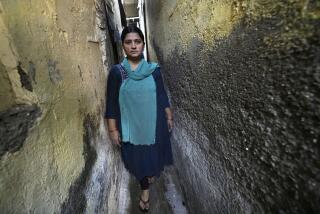Cry for help from India’s call centers
- Share via
NEW DELHI — The call center job came with a good salary and good perks, especially compared to many other opportunities for young people in India.
But as 26-year-old Vaibhav Vats says, it was doing him no good. His weight grew to 265 pounds and long overnight hours gave him little time for a social life. Eventually, he quit.
“You are making nice money. But the trade-off is also big,” said Vats, who spent nearly two years at an IBM Corp. call center handling customer calls from the United States.
Call centers and other outsourced businesses -- such as software writing, medical transcription and back-office tasks -- employ more than 1.6 million people in India, mostly in their 20s and 30s. But at this young age, they face sleep disorders, heart disease, depression and family discord, according to doctors and several industry surveys.
Experts say the brewing crisis could undermine the success of India’s hugely profitable outsourcing industry, which earns billions of dollars annually and has shaped much of the country’s transformation into an emerging economic power.
Heart disease, strokes and diabetes cost India an estimated $9 billion in lost productivity in 2005. The losses could grow to a staggering $200 billion over the next 10 years if corrective action is not taken quickly, said a study by the New Delhi-based Indian Council for Research on International Economic Relations.
The outsourcing industry would be hardest hit, the study found.
Reliable estimates of the number of people affected are hard to come by, but government officials and experts agree that it is a growing problem. Health Minister Anbumani Ramadoss wants to enforce a special health policy for employees in the information technology industry.
“After working, they party for the rest of the time,” he said. “We don’t want these young people to burn out.”
Most call center jobs involve responding to phone calls through the night from customers in the United States and Europe, some of whom can be angry and rude. It’s monotonous and there is little meaningful personal interaction among co-workers.
“There are times when the stress is so overwhelming that they fail to cope with it,” said Archana Bisht, who started a counseling company -- 1to1help.net -- in Bangalore six years ago.
Her clientele now includes 25 companies -- seven of them were added in the last two months -- including such names as Intel Corp., IBM, Hewlett-Packard Co. and MindTree Consulting Ltd.
Each day, about 60 to 70 employees of several companies, including Intel, IBM and Hewlett-Packard, seek counseling from 1to1help.net. Marital incompatibility and relationship issues top the list of problems, Bisht said, because long, odd working hours make it difficult for couples to spend much time together.
More women than men ask for help, she said. The outsourcing boom has created new employment opportunities for Indian women, but there has been little change in social expectations. Adding workplace demands to responsibilities at home, which often include taking care of in-laws, leaves women workers with multiple stresses, Bisht said.
Loneliness also can take a toll.
“There is no social life,” said Vats, who worked at night and either slept or watched television during the day. “You are not meeting new people.”
Some firms have taken steps to ease the problems. The National Assn. of Software Services Companies, the main trade body of the outsourcing industry, said many of its member firms were already providing advice on health and gym facilities.
Infosys Technologies Ltd. has established 24-hour help lines for psychological counseling. HCL Technologies Ltd. has built day-care centers for children and sponsors group outings for employees.
But nighttime work hours are difficult to avoid.
“The odd hours can play havoc with your health,” Vats said. “I never got good sleep because everyone was up and getting ready to go to work when I got home.”
Vats’ weight has dropped to 214 pounds since leaving his call center job two years ago. He’s still overweight for his 5-foot, 9-inch frame, but is much happier working for a law firm at a much lower salary.
A recent survey by the Dataquest research group and IDC consulting company showed that sleep disorders topped health complaints among workers in the outsourcing industry.
About 32% of respondents complained of sleep disorders, 25% had digestive troubles and 20% reported eyesight problems, according to the survey, which covered 1,749 employees.
Sleep and digestive disorders, doctors say, can grow into bigger problems: hypertension, diabetes and heart disease.
Doctors say the rise in these ailments, alongside growing urbanization and fast-paced economic growth, is not surprising.
But India’s case is alarming because of the sheer number of people affected and the factors that make them vulnerable to these diseases, said Ravi Kasliwal, a cardiologist at New Delhi’s Indraprastha Apollo Hospital.
“To top it all, there is lack of awareness,” Kasliwal said. “One out of 10 persons aged 35 years or more in this country is prone to heart attack.”
Heart disease is projected to account for 35% of deaths among India’s working-age population between 2000 and 2030, Kasliwal said, citing a World Health Organization study. That number is about 12% for the United States, 22% for China and 25% for Russia.
More to Read
Sign up for Essential California
The most important California stories and recommendations in your inbox every morning.
You may occasionally receive promotional content from the Los Angeles Times.













